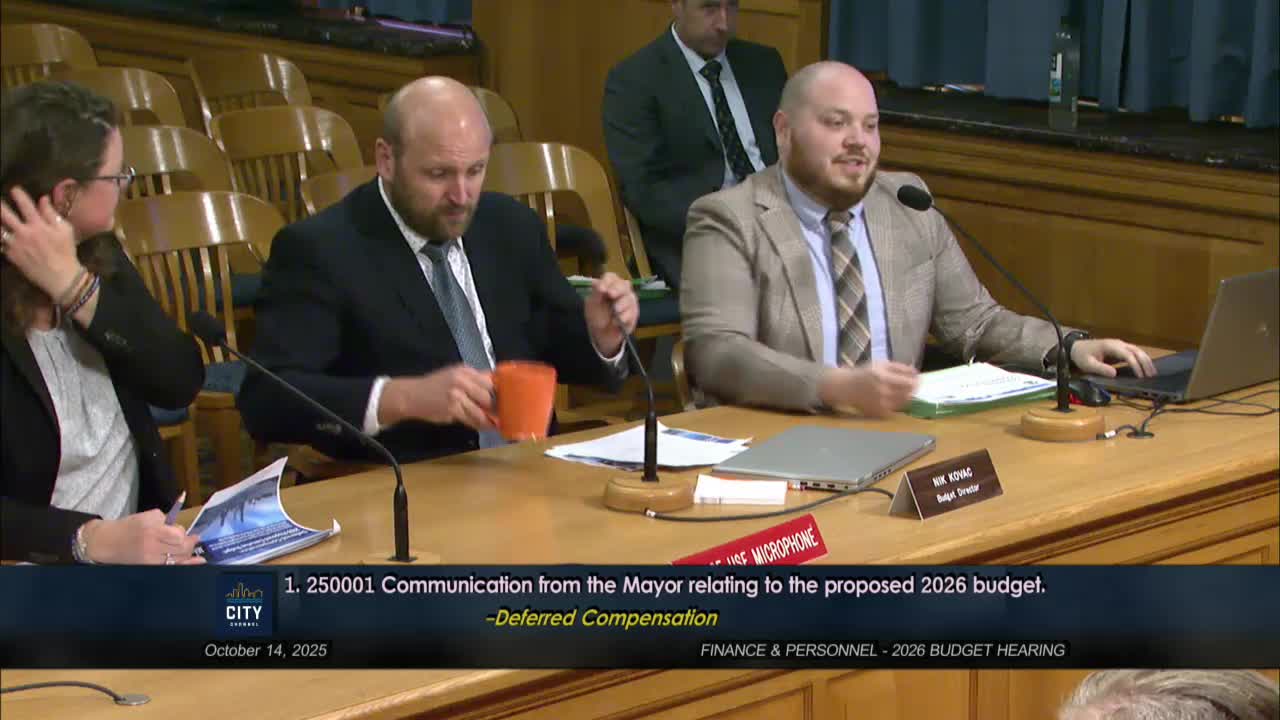Committee hears presentation on city deferred compensation plan; proposed 2026 budget holds steady at $543,377
Get AI-powered insights, summaries, and transcripts
Subscribe
Summary
The Finance and Personnel Committee reviewed the mayor’s 2026 proposed budget line for the City of Milwaukee Deferred Compensation Plan, hearing that the plan’s budget, staffing and fees remain unchanged from 2025 and that participation and average deferral rates are stable.
Aldermanic committee members on the Finance and Personnel Committee reviewed the mayor’s proposed 2026 budget item for the City of Milwaukee Deferred Compensation Plan on a mixed in-person and virtual panel, hearing that the plan’s 2026 request is unchanged from 2025.
The deferred compensation program’s 2026 proposed budget is $543,377, with three full-time positions and salaries unchanged, Director Cleary said. “Our mission … is to facilitate and help city of Milwaukee employees to save assets adequate and appropriate to enable them to retire at the desired time, to retire with dignity, and to enjoy sufficient income throughout retirement via a tax deferred deferred savings plan,” Director Cleary said, explaining the program’s goals and outreach.
Why it matters: Deferred compensation is a voluntary, tax-deferred supplemental retirement vehicle for city employees. Committee members pressed staff on contingency reserves, vendor contracting and participation trends because the plan’s operations and fees can affect take-home pay and retirement readiness for current employees and retirees.
Key facts and figures: The 2026 proposed budget total is $543,377; operating expense is $67,000 and equipment $3,000. The plan maintains three positions. The deferred compensation board has approved the proposed budget, staff said. Participation rose to 90% in 2025 from 89% in 2024; the plan’s average participant deferral rate is reported at 7%.
Contingency fund and vendor contract: Alderman Peter Bergellis asked about the plan’s special contingency account. Director Cleary and staff reported the standing balance is $75,000 and said the fund exists as a safety net primarily to cover possible litigation or special counsel costs, though the board has not drawn on it in recent years. Committee members were also told the record-keeper contract with Voya ends in 2026; the deferred compensation board is evaluating market-testing options, including an RFI or RFP, with support from its consultant.
Fees and benchmarking: The plan’s administrative model charges a per-participant recordkeeping fee (currently $50 per participant per year, reduced by $5 in the last contract), plus investment fees that vary by investment choice. Director Cleary said the plan’s blended administration fee is about 8 basis points. The board works with its consultant to seek “most-favored-nations” pricing with investment managers.
Participant outreach and disparities: The plan has been using auto-enrollment and periodic re-enrollment since design changes in 2016; the department credited auto-enrollment for improving participation and closing prior disparities by race and ethnicity. Staff said the board benchmarks participation and contribution rates by race and demographic group and that outreach includes in-person Voya educator sessions and monthly hybrid financial-wellness programs. Committee members requested further breakdowns — for example, savings rates by new hires versus legacy employees and by income quartile — and staff agreed to follow up with those data.
Other items discussed: Committee members asked about unspent money and year-end treatment; staff said unspent operating funds remain in the plan and that contingency funds, if unused, are reinvested in the plan. Budget office staff confirmed the deferred compensation budget reflected the mayor’s recommended budget with no net change from the 2025 adopted budget.
Ending note: Committee members did not take a final vote on the deferred compensation line in the meeting; a separate procedural motion at the close of the hearing placed the item “on hold” as part of regular committee scheduling.
